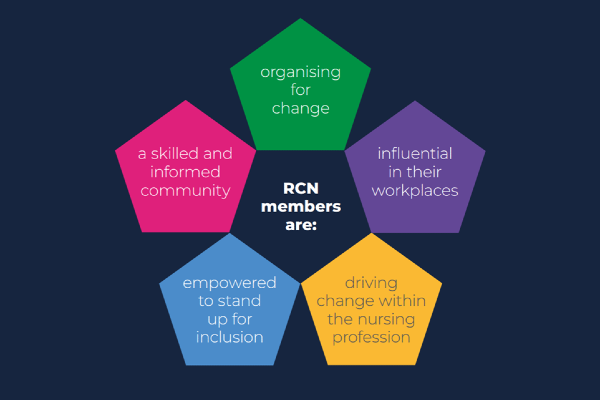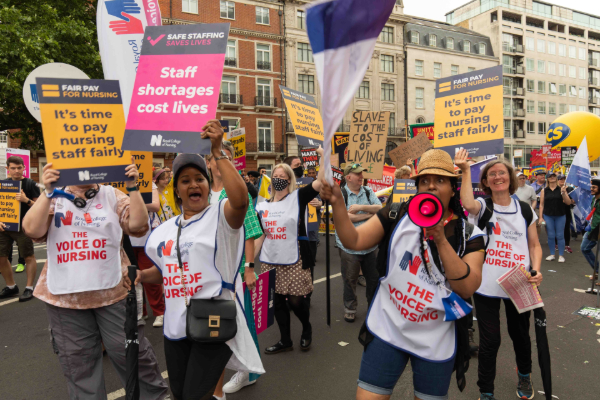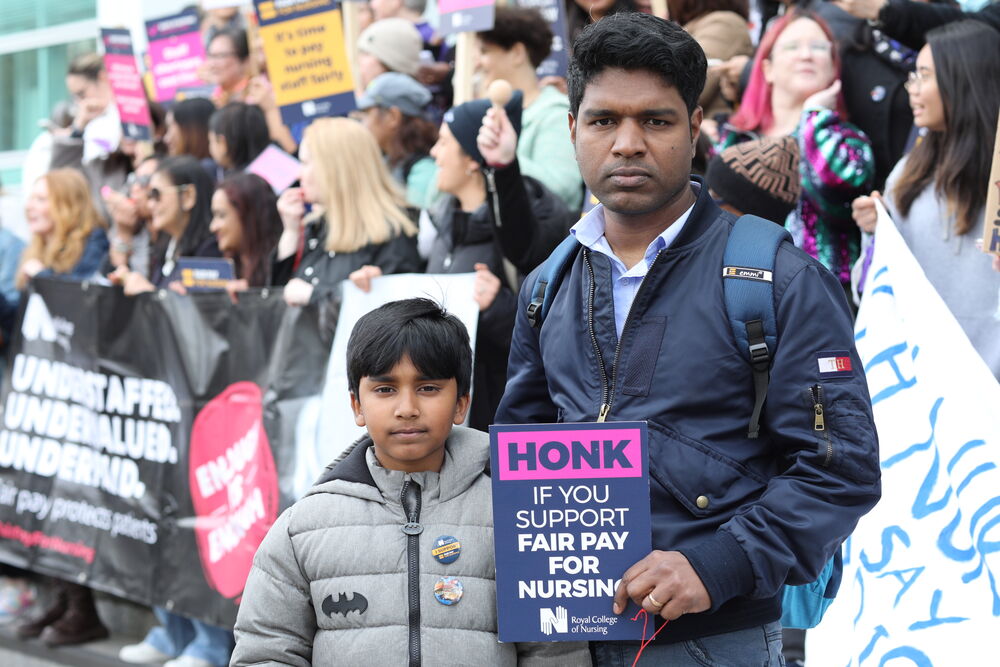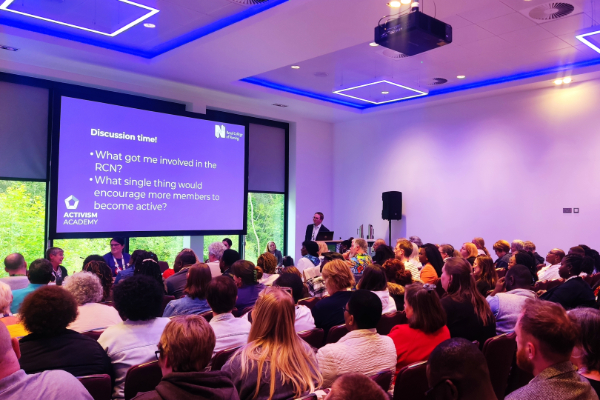The RCN Activism Strategy 2025 - 2027
A word from our General Secretary and Chief Executive, Nicola Ranger
I’m always inspired by how many nursing staff I’ve met in my career who have gone to incredible lengths to win change for nursing and for patients.
Nursing is a force for good, and to deliver lasting and meaningful change, we want to empower our membership to see their role in organising around the issues that they face locally – to change things for the better for the nursing profession now and in the future.
I’m delighted to present the RCN’s new three-year strategy as part of our work to grow the professional activism of our organisation’s brilliant and diverse membership. One of the reasons I joined the RCN was to fight for our profession – I’ve seen the problems we face first hand during my career and I wanted to help fix these.

I joined the RCN in the first week of the strikes and knew I was on the right side of history. It is a challenging time to be a nurse, and we need to be strong in valuing ourselves and our profession. That’s why activism matters.
The Activism Strategy is a first for the RCN and aims to reinforce the RCN as the voice of nursing, using the strength of our half a million members. It outlines a collective vision for activism at the RCN and the steps to achieve this vision together. Importantly, it was co-produced with our members and so it is grounded in their experiences and aims to address their top priorities.
This is an exciting time for activism in the RCN with members uniting to win change across our profession proving that you can make change – and win – when the system has stalled or is moving too slowly. There are so many great examples of impactful activism by our members, and we rightly celebrate these. As professional activists and active professionals we can make nursing and our College even more impactful.
This Strategy highlights our ambitious plans to grow the numbers of active members, to make us stronger than ever. We will also support members to organise together and make change, with dedicated resources and space for collaboration and learning. We will also invest in Professional Forum activism, encouraging more members to take up a role.
It is so important that we build on the ways in which we engage, grow and develop our activists – to fight for recognition for our profession.
The RCN Activism Strategy provides a roadmap for us all on how members can help to achieve change and shape the future of healthcare, and crucially, how we will create this meaningful change together.
Professor Nicola Ranger
RCN General Secretary and Chief Executive
Defining activism
The language we use is important, and the term activism will evoke a wide variety of meanings for different people based on their experiences and interests.
For the purpose of developing this strategy we have developed and adopted the following definition:
"RCN activism means taking action together to bring about positive change for nursing and our communities."

Five strategic visions for member activism
Five key strategic visions for RCN activism have emerged. RCN members are:
- organising for change
- influential in their workplaces
- driving change within the nursing profession
- empowered to stand up for inclusion
- a skilled and informed community.
Together, these represent a coherent picture of a community of active members within the RCN that has grown in its impact, its shared resourcefulness and its number, and brought the untapped potential of the RCN as the voice of nursing to bear in new and exciting ways.

Our members are… organising for change
To achieve our ambitions for nursing, the RCN’s shift to embrace organising cannot come too soon. Organising means achieving positive change by equipping members with the skills and tools they need to identify issues, build their own collective power and take effective action.
To deliver this, we need to bring about the changes within our organisation that will allow member-led organising to flourish, and that includes our culture, our systems and processes, and the skills and knowledge contained within our current active members and staff.
Secondly, we need to generate tangible examples of organising success, giving members the confidence that their participation is decisive in achieving the wins they want.

Branches can bring members together in their area to campaign on relevant issues, participate in internal democracy and build a sense of shared belonging and community among members. Whatever the future of our local structures looks like, we need effective, responsive and representative spaces for members to come together.
Making the shift to adopt organising within the RCN will not just benefit those members who want to create change in their workplace, or within their professional nursing specialism. Nursing students today face a myriad of complex issues. Investing in the activism of student members, facilitating them to win changes during their degree, their placements and beyond is crucial. It is a powerful message when recruiting nursing students to the RCN, and it embeds a culture of being active within the RCN that we want members to carry with them throughout their nursing careers.
The importance of growing student organising was highlighted in the Five-Year Strategic Plan, alongside a commitment to increase “support for Student Ambassadors to win change for student members including pathways beyond graduation to move student activists into becoming workplace activists”, RCN Five-Year Strategic Plan, p. 24.
Finally, our community of members who have retired have a valuable role as RCN activists. Many retired members do continue to make their mark, as branch activists, supporting campaigns such as Fair Pay for Nursing, representing the RCN within the National Pensioners Convention and more. More can be done to provide “retired members with a clear route into RCN campaigning and activism” as committed to in the RCN Five-Year Strategic Plan, p. 5.
Priorities
The RCN will:
- deliver ways for members and staff to develop and hone their organising skills, and make the adaptations needed to get the most out of organising
- support members to organise together and make change, including by dedicated resources including specialist organising staff, and a suite of initiatives and resources
- put member-led organising at the heart of our campaign activity, including Fair Pay for Nursing and Staffing for Safe and Effective Care
- comprehensively review the mission and purpose of RCN branches, first assessing their current effectiveness. When complete, lead an appropriate renewal programme, including updating branch terms of reference, updating branch roles and role descriptors and developing new learning and networking opportunities specifically for branch leaders
- review the Student Ambassador role and develop a high-quality learning and development offer and work with the elected student leadership of the College to build a plan for student-specific campaigns and organising messages
- invest resources into the activism of retired members, providing the support and a clear route into relevant, meaningful RCN campaigning and activism via a member network.
Our members are… influential in their workplaces
Improving the RCN’s influence in the workplace is critical if members are to achieve the pay, terms and conditions they deserve. Nursing staff often find themselves subject to bad decisions at all levels and these can impact the quality of patient care nursing staff can provide and the experience of nursing altogether.
RCN workplace representatives are critical to ensuring that RCN members are supported at work and can organise together to win meaningful change.
The RCN’s Five-Year Strategic Plan sets out an ambitious but necessary goal to treble the number of RCN workplace representatives. Currently, we don’t have the number of reps in all workplaces that members need. There is much more we can do to grow the RCN rep community, improve the experience of being a workplace rep, and provide the resources and data they need to be as impactful as possible.

Turning this around is a priority, and to do that the RCN will need more members to get involved and build our collective strength in the workplace. To do this, members must be emboldened to act in the interests of nursing and their patients.
We must recognise that taking up a formal rep role isn’t for everyone, and the RCN’s professional agenda can be served by having RCN members acting as visible points of contact for the organisation in the workplace.
The RCN should be visible in every workplace, and all members should understand how the RCN uses our collective power to identify and resolve issues. Achieving an upturn in local activism will enhance the RCN’s reputation by delivering more tangible change for members.
Priorities
The RCN will:
- expand our number of workplace representatives, setting achievable targets in each country and region to improve our rep numbers. New resources and processes will be delivered to make these targets meaningful
- increase the diversity of the RCN rep community so that it reflects our membership
- review the rep roles and role descriptions to ensure they meet our influencing and organising objectives and are fit for purpose and relevant to every workplace sector and setting
- explore the creation of a new non-rep role akin to the ‘RCN ambassadors’ currently used in Northern Ireland, supported by a UK role descriptor, learning and development programme and means to build peer-to-peer relationships
- improve the experience of workplace reps, enabling them with the means to communicate effectively and responsibly with the members they serve; an updated approach to facilities time; a platform within which they can support and mentor each other; access to a comprehensive programme of learning and development, materials and resources.
Our members are… driving change within the nursing profession
The crisis in the UK health care system means that every day, nursing professionals are not able to provide the standard of patient care they want to. Nursing staff know the difficulties they face in daily clinical practice, and it is within nursing that the solutions will be found.
This requires the expertise of RCN members to be fully respected in clinical practice, in leadership, in research, and in education. RCN members are best placed to lead positive change for nursing. They have the insight, the skills and the experience needed to identify, develop and drive the necessary improvements, and must be influencing policy and decision making at all levels.
The RCN’s Institute of Nursing Excellence uses expertise and evidence to tackle the challenges facing nursing, and in doing so increases the power and reach of the RCN as the ‘Voice of Nursing’.

The RCN has the expertise of every clinical specialism, and in every nursing discipline. That is why the RCN Five-Year Strategic Plan calls for greater investment in the RCN’s professional forums. Nursing activism has the power to drive positive changes within health and social care, and within clinical specialisms, education and research.
This calls for RCN members to become professional activists, working with other RCN members to improve the standing and influence of nursing. Nursing Workforce Standards Champions are a recent very important addition to the range of activist roles available to members in the RCN.
Priorities
The RCN will:
- invest in forum committee activism, encouraging more members to take up a role, including by expanding training and development for forum chairs, and creating new initiatives to improve succession planning and leadership development within forum committees
- expand and deepen support for Nursing Workforce Standards Champions to organise for the implementation of RCN’s standards for professional practice in every health care setting
- introduce RCN accreditation for activists within forums, and use this and other measures to ensure employers understand the role of forum chairs and how having employees within RCN forums is beneficial to their organisations
- improve the ways in which forum members can organise together on relevant issues
- work with higher education institutions to promote development and expansion of nursing activism modules within nursing degrees, and explore comparable projects for nursing support workers and nursing associates
- develop new means for senior nurse leaders to support the forums and the College’s professional advocacy.
Our members are… empowered to stand up for inclusion
The RCN draws strength from the powerful diversity of our membership.
All RCN members must have accessible and inclusive routes to activism within the RCN and all members should be able to help lead the RCN’s work and priorities.
The Five-Year Strategic Plan committed the organisation to: “proactive engagement with and development of self-organised communities of active members seeking to influence across their various identities and protected characteristics” and the RCN’s new strategy on Equity, Diversity and Inclusion builds on this and sets out a powerful vision for members organising together in new ways. This Activism Strategy complements the requirements set out there.

The RCN recognises the enormous contribution that internationally educated nursing professionals (IENs) make to health and social care. It also understands the specific challenges they face when they first arrive and start working in the UK and can experience throughout their nursing career here.
The RCN has a considerable offer supporting the RCN’s IEN community and this must be increased to enable more members to have the confidence and safety to become active members too.
Priorities
The RCN will:
- launch and sustain member groups for those who experience inequality and injustice to organise on relevant issues and to take their interests and perspectives into the heart of the RCN via the EDI Committee and other routes
- forge stronger links with international nursing associations that are already active and organising nursing communities in the UK
- develop tailored means to encourage and support internationally educated nursing professionals into activism and leadership roles within the College
- improve the impact of accredited representatives on equality issues within workplaces, and enable members to identify and organise around equalities issues in their workplace
- provide learning and development support for all activist role-holders to engage with the EDI agenda.
Our members are… a skilled and informed community
If we are to bring about this collective transformation in the quantity and quality of the activism of the RCN membership, we must invest in those members who step forward to lead. This entails high-quality support for activists at all stages of their journey.
RCN members lead busy lives, so participating in the RCN must feel rewarding, developing and impactful. Many of the attributes that nursing demands as a profession are those needed to be outstanding activists and this is a great advantage we have as an organisation.

The support, learning and development activists need should not be limited to formal programmes. There is lots of experience and potential for peer-to-peer support between activists and this will be a cornerstone of the future activist experience.
Priorities
The RCN will:
- create new and effective means and platforms for active members to collaborate with each other, and to communicate with their relevant member constituencies
- comprehensively review its activist learning and development (L&D) offer and ensure its long-term impact is measured effectively, and that suitable content forms a new joined-up curriculum for multiple activist roles
- create a ‘Governance Leadership’ L&D pathway, with bespoke modules and mentoring to support those members who are elected to RCN Country or Region Boards, Professional Nursing Committee, Trade Union Committee and Council and those who want to stand for these positions in future
- similarly, ensure a consistent induction and development experience for those members elected to the UK Reps, Nursing Support Workers, and Students committees
- review and enhance the support and mentorship needs of all activist groups, and supervision requirements where required, mindful of the benefits this will bring to RCN active members in other spheres of their lives
- reaffirm roles and structures to ensure they are clearly understood by activists and RCN staff
- launch a Political Leadership Programme to develop the advanced skills and knowledge of those activists who want to deepen their participation and activism.
How we will deliver on the Activism Strategy
We will focus on identifying the actions required to fulfil specific outcomes. We will develop a number of distinctive workstreams to fully resource this work and members of the Trade Union Committee and Professional Nursing Committee will have the means to shape plans and will receive regular progress reports. We will ensure that RCN Council is regularly appraised of the progress towards realising this Strategy.
We will put in place effective measures to transparently review and monitor progress and a core principle within this will be for members to be at the heart of this process, so that everyone can have confidence in the direction, successes and lessons learnt.
Each of the priorities outlined in this strategy will have milestones and goals associated with them that will show how and when they are achieved. They will form part of an implementation plan for the strategy, which will set out overall timeframes and review dates.

The role of the RCN Activism Academy
This is a strategy for the Royal College of Nursing as a whole. Achieving the vision set out in this strategy requires the contribution of all members and the entire organisation.
Some elements will be driven by various parts of the organisation, in member committees, forums, and networks, with the support of appropriate staff teams, such as those working in countries and regions and in UK-wide departments.
The RCN Activism Academy will co-ordinate and manage progress of the strategy.
The Activism Academy is a new initiative and exists as part of the RCN’s Institute for Nursing Excellence.

It exists to drive a transformation in the RCN’s number and impact of RCN’s active members. To do this it sets out to:
- Enable a supportive culture and environment for members to become active and make change. By growing our activist communities and making the experience of being active the best possible, we will facilitate them to make effective change for both the nursing workforce and the profession.
- Use the organising approach so that RCN members wherever they are, are influential in the decisions that shape the experiences of the workforce and the profession.
- Deliver learning and development for RCN activists that provides a thorough grounding in their role and also offers opportunities for developing, excelling and leading in their roles.
The Activism Academy is one of the five academies of the new RCN Institute of Nursing Excellence, but also a department of staff comprised of three teams:
- Activist Engagement
- Activist Learning and Development
- Organising
The Activism Academy draws on and is informed by the collective experience and insight of the RCN membership. By working closely with the Trade Union Committee, the Professional Nursing Committee and others, the Activism Academy will work to co-ordinate and where appropriate lead delivery of the work described in this strategy. Members can find out more and participate in this work by visiting the Get Involved section of the RCN website.
Notes on our approach
The development of the RCN Activism Strategy comprised a variety of means to ensure that the perspectives of nursing staff and other key stakeholders shaped the strategy.
A variety of engagement events and activities have taken place to gather evidence from a range of stakeholders, enabling the creation of a strategy that is inclusive and responsive. These started in March 2024 with surveys sent to RCN activists and staff to ask about how they would build RCN activism.
This intelligence was further developed throughout the summer across the UK through a combination of staff focus groups, discussions at member and staff gatherings, workshops and member Q&A sessions.

This approach ensures that our focus moving forward is evidence-based, and addresses critical issues such as safe staffing levels, fair pay, and working conditions. As a result, the RCN Activism Strategy is grounded in the experiences of members, making it relevant and effective in advocating for the nursing profession.
The RCN’s Five-Year Strategic Plan (2023) put forward a number of commitments and ambitions for our organisation. Where these relate to growing the activism of our membership, they have been included within this strategy, with additional detail to give further information on how they will be realised.
The Equity, Diversity and Inclusion (EDI) strategy (2024) sets out a number of important ambitions that depend upon the activism of RCN members. These objectives have been woven throughout the RCN Activism Strategy.
Page last updated - 02/06/2025





